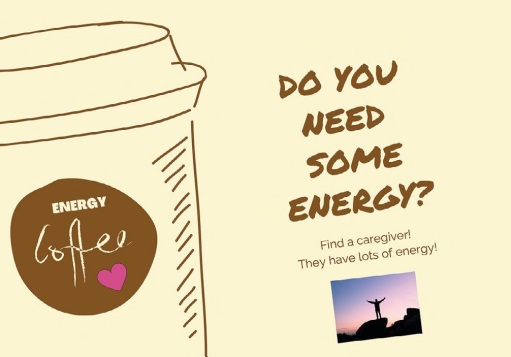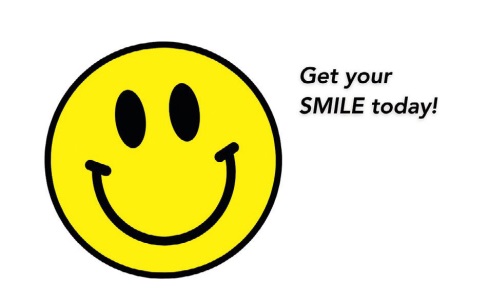Host: Before I introduce our special guest of the day, we are going to a commercial break and will be right back!

COMMERCIAL: Today's WEPC show is sponsored by Energy Coffee. Morning comes and your child who has a disability is making sounds. It is discovered that they your child is wide awake and needs assistance. Without getting yourself dressed, you take care of your child's daily needs, and get her ready for the day. As long as you are on a roll, medications and supplies are refilled, messages are left at the doctor's office and then your stomach growls. With a kiss and a hug, you get your child off to school and sit down at the table to absorb what just happened. Relishing the moment of silence, you pick up your Energy Coffee, savoring each sip for the day. Energy Coffee! Enjoy your quiet moment with your favorite, Energy Coffee! After all, WEPC and Energy Coffee are recognizing all caregivers today!
Host: And we're back! Remember folks WEPC is the station where we support all caregivers all the time. So let's get right into our show. Today we are thrilled to have Bobbie as our guest. Bobbie is a two-time caregiver and I will stop there. Bobbie, welcome to the show!
Bobbie: Thank you for having me.
Host: So Bobbie, what types of people are caregivers?
Bobbie: They are school principals, first responders, executives, plumbers, and so forth. They are grandparents, young children, spouses, friends, and more. They come from all walks of life.
Host: How did you become a caregiver?
Bobbie: Well, some go to school to be professional caregivers. According to caregiving.org ( caregiving.org/caregiving-in-the-us-2020) "there are 53 million family caregivers as of 2020" which they say is about "1 in 5 Americans." But I think there are more. I did not know I was one until someone told me I was. There was no education and I certainly never signed up or desired to be one when I grew up. It happened in a few brief moments. My spouse was in a hit/run accident, became paralyzed, and needed help. Caregiving became my calling upon my loved one's diagnosis and until his passing. However, I am a caregiver once again.
Host: Wait! What? How did that happen? Doesn’t it only occur once?
Bobbie: No, sometimes caregiving roles happen multiple times. Sometimes it is once for a few months or can last for 30 or even 50 years. I became a caregiver again, or 2.0 as I like to say, when my child was diagnosed with functional neurological disorder; a glitch in the brain.
Host: Caregivers aren't just for the elderly?
Bobbie: Oh no! Caregivers can be for anyone, any age, any time, anywhere, with any diagnosis that requires their assistance to live in society. Some children have developmental disabilities, some have stomas, some have the absence of a limb, some cannot speak, the list of those children who would need a caregiver is very long. Some babies and some teens need caregivers. A loving parent does not let age dictate when caregiving love ends. Can I offer a thought?
Host: Yes, please!
Bobbie: In my humble opinion, family caregivers are the most unknown, unrecognized, underpaid, and overlooked people. They take on a second job “for more than 40 hours a week” according to an article by the National Alliance for Caregiving in collaboration with the AARP in November 2009 [https://www.caregiveraction.org/resources/caregiver-statistics]. Many of these caregivers care for their child, without days off and yet are still expected to operate a normal daily life like everyone else. If a family caregiver were given a salary, how much would it be?
Host: Hold that thought, Bobbie. We have to break for another commercial and make our sponsors happy.

COMMERCIAL: It’s impactful! It’s contagious! It burns calories! You cannot crave too much of it. Coming to a location near you! Go get, “Smile!” It will always remind you how amazing you are and more. That’s “Smile”! Go out and get one today! Smile!
Host: So Bobbie, you wanted to know how much a caregiver, if paid yearly would make. My staff went and looked it up. According to ziprecruiter.com (www.ziprecruiter.com/salaries/Caregiver-salary-per-hour), “professional caregivers make about $26,000 a year or $12 per hour.” Additionally in another article by the National Alliance for Caregiving in collaboration with AARP (www.caregiveraction.org/resources/caregiver-statistics) says that “there are about 8.4 million parents caring for their own children with disabilities under the age of 18.” Did you also know that the National Family Caregiver Support Program created in 2000 is available to provide financial assistance and other resources in some states and some situations to help parental caregivers?
Bobbie: I would be happy for any financial assistance! Caregivers do not get the chance to save money, take care of their health or even get respite because there is no funding. What little funding there is usually ends up being for a brief hour or so and only if it is deemed medically necessary by the insurance providers.
Host: Are those the only challenges?
Bobbie: Oh no! Are you kidding me? When you become a caregiver, you also take on any multitude of other jobs such as social worker, therapist (PT/OT/ST), psychologist, driver, carpenter, mechanic, and of course my favorite, advocate! Do not forget that you are also